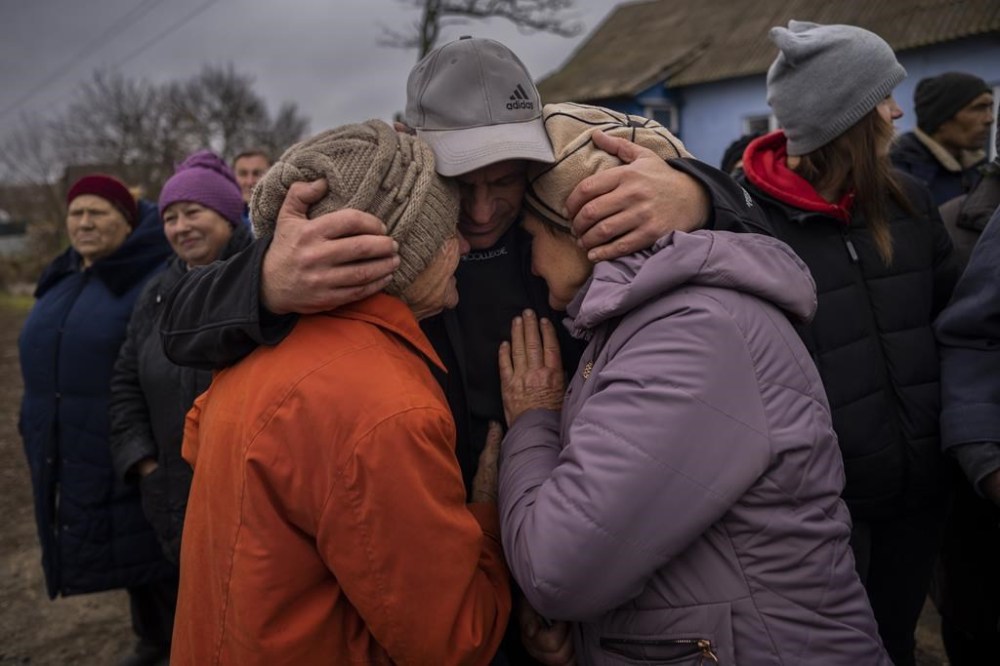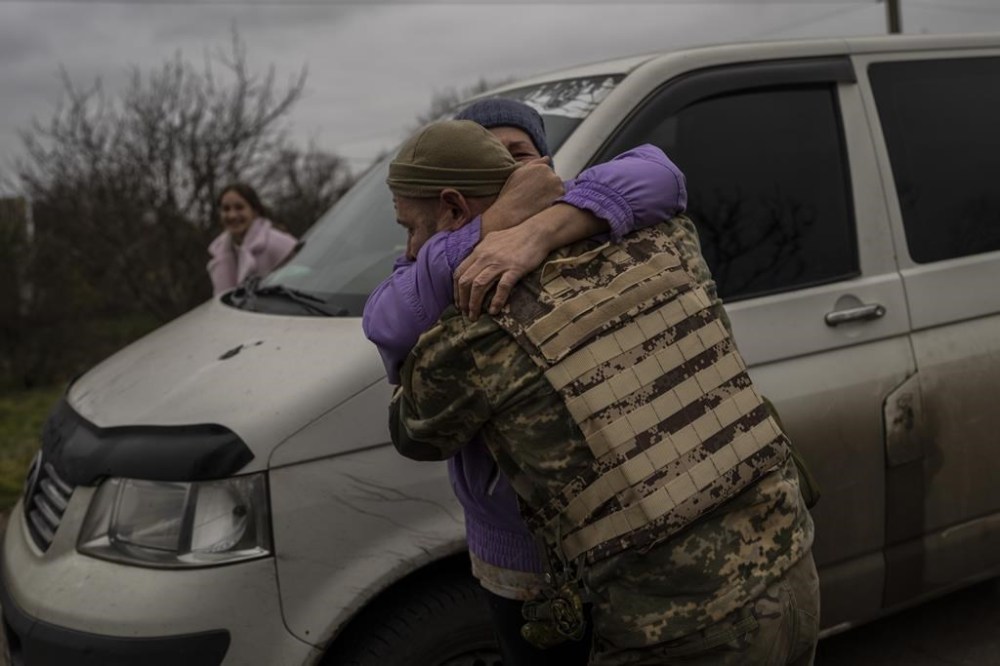Families reunited following Russian retreat in Ukraine
Advertisement
Read this article for free:
or
Already have an account? Log in here »
To continue reading, please subscribe:
Monthly Digital Subscription
$1 per week for 24 weeks*
- Enjoy unlimited reading on winnipegfreepress.com
- Read the E-Edition, our digital replica newspaper
- Access News Break, our award-winning app
- Play interactive puzzles
*Billed as $4 plus GST every four weeks. Offer only available to new and qualified returning subscribers. Cancel any time.
Read unlimited articles for free today:
or
Already have an account? Log in here »
Hey there, time traveller!
This article was published 15/11/2022 (840 days ago), so information in it may no longer be current.
TSENTRALNE, Ukraine (AP) — Relatives embraced in the middle of the road. They squeezed hands and choked back tears. Others sobbed outside their homes. All had yearned for this same moment — to be reunited with their loved ones after Russian troops withdrew from their villages in southern Ukraine.
Families were torn apart when Russia invaded in February, as some fled and others hunkered down. Now many are seeing one another for the first time in months, after Moscow’s latest retreat amid a Ukrainian counteroffensive that has retaken a pocket of territory wedged between the regional capitals of Kherson and Mykolaiv and the Black Sea.
The most significant withdrawal was from the city of Kherson itself, but troops also pulled back from nearby villages in recent days. The Associated Press visited four such villages this week and watched as people were reunited with relatives.

“This is just an explosion,” said Andriy Mazuryk. The 53-year-old left his mother in her village of Tsentralne in April and fled some 30 kilometers (18 miles) away.
His mother didn’t want to leave, but Mazuryk has a son in Ukraine’s army and worried the Russians would kill him. Even though the occupying troops seized people’s phones, Mazuryk managed to speak to his mother and other relatives almost daily because they made calls in secret, he said.
“Thank God, we were in touch every day … relatives took risks,” he said.
More than half a million people have fled the Mykolaiv and Kherson regions since February, according to local authorities, although exact numbers are hard to calculate. It’s unclear how many have returned.
While some people, like Mazuryk, had only a short distance to cover to return home, others traveled from across the country when they learned the Russians had left. Igor, a soldier, was given time off from fighting in the hard-hit Donbas region so he could see his family.
Jumping out of a van in the village of Vavylove, Igor welled up as he hugged his mother, who was waiting for him in the middle of the road. “I knew that it would happen, that we will win and our whole land will be liberated,” said Igor, who spoke on condition only his first name was used as is typical for Ukrainian soldiers because of security concerns.
Some villagers said they were surprised at how quickly the Russians left. After Russia announced a partial mobilization of some 300,000 reservists in September, locals said thousands more soldiers poured into the area and heavily mined it.
Several people said that in the weeks before the retreat, Russian soldiers stockpiled equipment and dug trenches, making it look like they were going to stay.
While most people said the Russians kept to themselves, living conditions under their occupation were wretched: Electricity, water and phone service were cut. Bridges were blown up, making it hard to move between villages to buy and sell food. And mines lurked everywhere.
The Russians are gone — but those problems remain.
There have been at least a dozen accidents involving mines in recent days, said Oleh Pylypenko, the head of the administration that covers the villages the AP visited.
Speaking to residents in each town on Sunday as local volunteers distributed food aid, Pylypenko warned people not to let their children play in abandoned trenches and promised that he’d restore power, water and communications as soon as possible.

With winter around the corner, aid groups warned that restarting such services quickly was critical. “We have to act fast to prevent a humanitarian catastrophe during the winter months,” said Saviano Abreu, spokesman for the U.N. Office for the Coordination of Humanitarian Affairs in Ukraine.
Still, most people in the villages said they weren’t too worried about the future. They were just happy the Russians were gone.
“This is the first night I’ve been able to sleep,” said Galina Voinova, a resident of the village of Znamianka. Since February, she’s been falling asleep to the sound of shelling, she said.
But the agony of the occupation hasn’t ended for everyone.
Tatiyana Pukivska’s husband was arrested by the Russians because they were told he was giving the Ukrainian army coordinates of their positions, she said. The 41-year-old resident of Tsentralne said she hasn’t seen him since, as she wiped away tears from her cheeks.
Standing nearby, her mother-in-law dried her eyes.
“Oh my God it’s horrible,” Lesia Pukivska said holding a photo of her son’s ID card. “I feel that he is alive and that he will return home. If only someone could help us, we are powerless.”
___
Follow AP’s coverage of the war in Ukraine: https://apnews.com/hub/russia-ukraine


